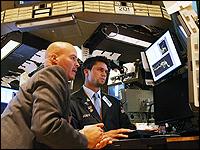Transcript
BOB GARFIELD:
Media mistakes happen every day and sometimes they matter. This week, they mattered a lot to United Airlines and its shareholders. The fiasco started last weekend when a Chicago Tribune article from 2002 somehow managed to be the most-viewed business story on The South Florida Sun-Sentinel’s website, creating a new link on The Sentinel’s homepage. The article was about United Airlines filing for bankruptcy – six years ago.
Next, automated software from Google News picked up the scent, stamped on a current dateline and linked to it. Then, an analyst from a Florida investment firm noticed it on Google News and, without realizing the story was from 2002, posted a summary on the Bloomberg Financial Information Service.
Financial analysts across the world received that bulletin, and within minutes, 15 million shares were sold and a lot of people lost a lot of money because, as New Yorker writer James Surowiecki observes, Bloomberg Financial Information Service is the central news source for markets the world over.
JAMES SUROWIECKI:
Every trading desk has a Bloomberg terminal, which essentially is a kind of information circulatory system for the financial world. One of the consequences of that is that everyone knows that news that appears on Bloomberg is action news, essentially, actionable news, and that people are going to be trading on it, which in turn makes everyone else more likely to trade on it. [LAUGHS] So once it went out there, then that basically triggered the first round of selling.
BOB GARFIELD:
People dumping United Airlines shares wholesale. The stock went down to three dollars before trading was halted. Now, eventually United’s stock price went back up – it’s just under eleven dollars as we speak on Thursday. But it was obviously a tumultuous event for the company, and some investors, who dumped shares on bad information, lost vast fortunes. This is clearly a cautionary tale, but of what?
JAMES SUROWIECKI:
For me, this is kind of an [LAUGHS] object lesson in the perils of complete automation. For me, what it really comes down to is time, that this is all about the centrality of speed, both to the news business and the financial business.
Because speed is so important and because machines are so much faster than humans, you end up with these situations where nobody - nobody checked. I mean, that’s basically what we're talking about, right? I mean, no one [LAUGHS], no one just paused and said, wait a second, United Airlines [LAUGHING] is declaring bankruptcy?
BOB GARFIELD:
Now, you have written about the wisdom of crowds. In fact, that was the title of your bestselling book. This episode seems pretty much like an example of the stupidity of the crowd, one piece of bad information snowballing into an avalanche of dumb.
JAMES SUROWIECKI:
I think that’s exactly right, although [LAUGHS] the only thing I would say is, you know, part of what’s weird about this is that the crowd, in this case, was in large part probably made up of machines.
You know, a couple of things are going on here. One is that there’s a tremendous amount of automated trading. You put in numbers and you say, you know, if it breaks through the 52-week low or something, you dump your shares, and so on. And I'm sure that was a large part of what was driving the selling.
You know, there probably weren't that many human beings actually making a decision, and had there been more human beings actually thinking, I think it probably would have turned out better.
But I think you’re right, I think it is a classic example of sort of the folly or the madness of crowds. And I would argue that a lot of the price movements in the stock market over the last five or six months are like that. And to me, the biggest problem is that in this market investors, for the most part, are not really thinking for themselves. They are really spending an enormous amount of time looking at what everybody else is doing, and it’s a recipe for folly. It’s a recipe for madness.
Groups really are only smart when each person is kind of acting like an individual, and in this market [LAUGHS] there are just very few people who are willing to take the time to think for themselves.
BOB GARFIELD:
James, thank you very much for joining us.
JAMES SUROWIECKI:
I appreciate it. Thanks a lot.
BOB GARFIELD:
James Surowiecki writes the financial page for The New Yorker Magazine, and is author of The Wisdom of Crowds.

